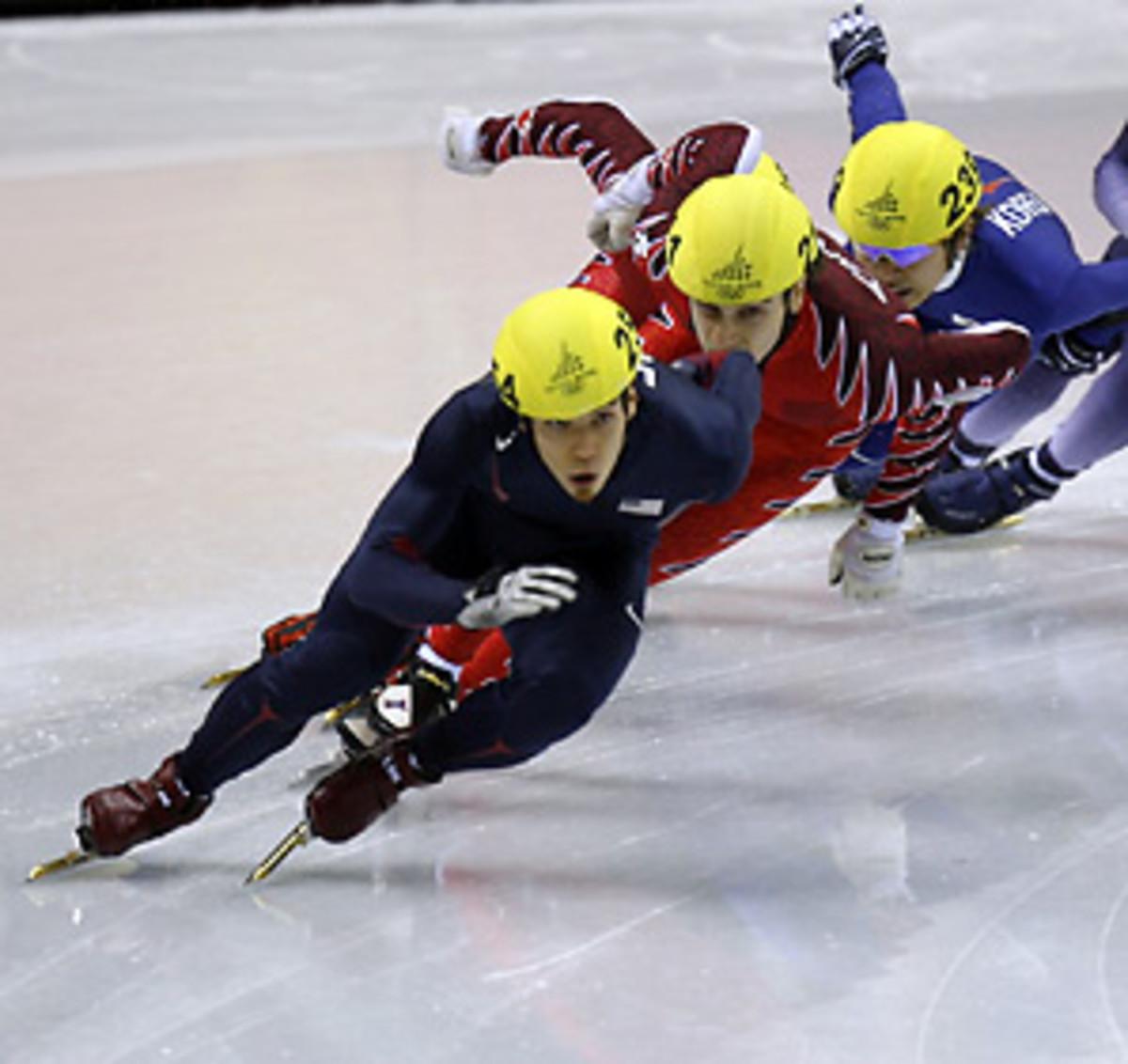
Vancouver short track preview
Consider it the edgier, thrill-seeking little brother of the traditional long-track form. Four racers line up, first to the finish line wins. No lane lines, just a pack of racers trying to outmaneuver each other to the front.
Why should you care? Because Stephen Colbert said so. And if that doesn't convince you, consider that the length of the track (about 365 feet to long track's 1,312 feet) sets up a lot of turns, which can lead to wipeouts, and the close proximity of all the skaters introduces the risk of collision and/or disqualification, making short-track the more exciting breed of racing to watch. But ultimately, the short-track race is more about strategy, about when to make a move, than it is about beating a clock.
Apolo Anton Ohno, U.S. The Seattle native considers Vancouver to be his home away from home, having competed and trained in the Canadian city three hours away growing up. So the 2010 Games feel like a homecoming of sorts for the 27-year-old, two-time Olympian. The most decorated American short-track skater has become the telegenic face of the sport, and he's a surefire contender in every race.
Lee Ho-Suk, South Korea. It's difficult to name one competitor from a country that concentrates all of its winter athletic ability into a single sport, but Lee emerges from the shadows of Ahn Hyun-Soo, a three-time gold medalist who failed to qualify for Vancouver, to lead the team in 2010. Though he's the reigning overall world champion, Lee might best be known for finding that sliver of space between leader Ahn and Ohno with just half a lap left in the 1,000-meter race in Turin in 2006.
Wang Meng, China. After collecting a full set of medals in Turin -- gold in 500m, silver in 1,000m and bronze in 1,500m -- the 24-year-old Wang heads into the 2010 Games as the reigning world champion in the 500- and 1,000-meter distances and is the top-ranked female skater in the world. If all the stars align, she could even sweep gold in every event, a first ever in the women's sport.
Charles Hamelin, Canada. The 25-year-old Quebec native will be the Canadian favorite. Part of the '06 silver medal-winning relay team, Hamelin has since become the nation's premiere short-track star since, particularly in the 500. He enters Vancouver the reigning world champ in the distance.
For the men, Ohno will certainly garner all the attention. The Dancing with the Stars champ has five Olympic medals already, two of them gold, and had a spectacular '08, when he finished No. 1 overall at Worlds. But Ohno isn't the only kid on the block anymore. He'll be joined at the head of the pack by 19-year-old J.R. Celski, whose most vivid Olympic memory as a child was watching Ohno win gold in the '02 Games in Salt Lake.
Celski burst onto the scene last year, finishing second overall at his first World Championships, three places higher than his teammate Ohno. But last September, Celski suffered a horrific injury at the Olympic trials, when he crashed into the boards and cut deep into his thigh with his skate. Though it's taken months to heal, Celski says he will be ready to challenge Ohno and the rest of the world in Vancouver.
The U.S. women's team won't have quite as many medal favorites as the men, but Katherine Reutter has demonstrated she can compete with the best in the world and could be a dark horse contender to bring home the first U.S. women's short-track gold since 1994. At the '09 Worlds in Vienna, she had three top-five finishes and earned two gold medals in World Cup races last fall.
Canada vs. South Korea in the men's 5,000-meter relay. The short-track relays are perhaps the most mesmerizing event to watch at the Games. Like a track relay, each team has four skaters, but they are free to switch up whenever they are in the straight-away -- but typically change every two laps or so -- in a carefully choreographed handoff, where the retiring skaters gives their teammates a push to start their legs.
South Korea and Canada finished in the top two spots in Turin, and again in the '07 and '08 World Championships. Neither made it to the finals in '09 because of falls, but they will be heavy favorites in Vancouver. Korea has typically come out on top, but Canada will have the home-ice advantage. If the U.S.' Celski comes out undeterred after the injury, the U.S., the '09 champs, could pull an upset.
South Korea has won 62 Winter Olympics medals, 60 in short-track speed skating. Talk about a one-trick pony.
Men's 1,500 meters: Feb. 13Women's 500 meters: Feb. 17Women's 1,500 meters: Feb. 20Men's 1,000 meters: Feb. 20Women's 3,000-meter relay: Feb. 24Men's 500 meters: Feb. 26Women's 1,000 meters: Feb. 26Men's 5,000-meter relay: Feb. 26




